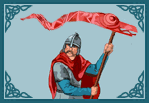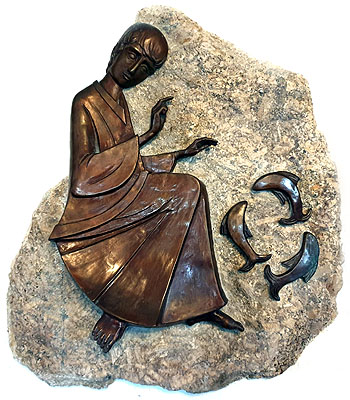 |
 |
|||
|
|
Prince Selevan of Dumnonia, like his brother, St. Just, entered the church. He was known by the commom people as St. Levan and he lived in the village now named after him. Originally he settled in Bodellan, but quickly moved on to St. Levan, treading the path that still exists today between there and Chapel Porth Cove (alias Porth Selevan). On the clifftop here stands his well and a flight of steps descend to the ledge were the remains of his chapel and hermitage. In the churchyard at St. Levan is a large rounded pre-christian sacred boulder. The clever saint used the site of this pagan idol to build a church, so its holy reputation was maintained. St. Levan used the stone as a resting place on which to sit on his return from his numerous fishing trips. He often preached from here. Just before he died Levan struck the stone hard with his fist. The rock split in two and the saint declared: When, with panniers astride, We've got some way to go yet! One writer declared in 1881 that despite knowing the stone for fifty years he had never discerned any movement at all. Levan ate but one fish a day, and refused to fast even on the Sabbath. Once while on his way to do a little fishing on a Sunday, the saint was rebuked by a local woman named Joanna who was out tending her herb garden. The saint quickly retorted that fishing was no worse than gardening. The woman insisted he was in the wrong. An arguement ensued in which St. Levan finally called the woman a fool and proclaimed that in the future any child of the parish called Joanna would find herself to be as stupid as her namesake. Hence no Joannas have since been born in St. Levan. On one of his fishing trips he caught two chad (bream) on the same hook. Only wanting his customary one fish, he threw them both back, but a second and a third time the two returned to his hook. Taking this as a sign, St. Levan eventually returned home with the both fish and found his sister, St. Breaca, awaiting him with her two sons. St. Levan cooked the chad and served them up to the two ravenous children, but the unfortunate pair neglected to remove the bones and both choked on their dinner. The accursed fish have since been known as chuck-cheels or "Choke-childs". Records of St. Selevan date back to the 14th century. He is generally considered legendary.
|
|||
| © Nash Ford Publishing 2001. All Rights Reserved. | ||||





 St. Selevan
St. Selevan